News
Fuel tankers stranded as NNPCL, Dangote haggle over pricing
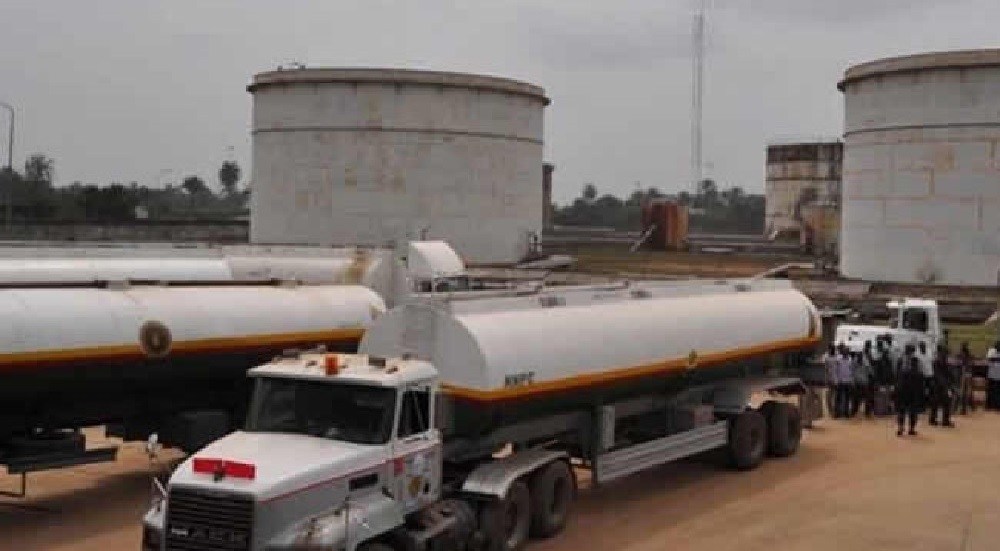
Oil marketers have yet to commence the loading of Premium Motor Spirit, popularly called petrol, despite assurances by the Federal Government that the commodity will be available this weekend.
It was gathered that though some PMS vessels had arrived in the country at the NNPC’s Apapa and Port Harcourt depots, loading by independent marketers had yet to begin.
As a result, petrol queues in major cities persisted on Friday despite the Minister of State for Petroleum Resources (Oil), Heineken Lokpobiri, earlier promising that the product would be massively available before the weekend.
But the National Operations Controller of the Independent Petroleum Marketers Association of Nigeria, Mustapha Zarma, said on Friday that the loading of products at depots had yet to commence, stressing that the queues could last till Monday.
“Maybe the improvement in supply will start tomorrow or Sunday but as of yesterday (Thursday) and today (Friday), there has not been much loading of products. And even if there has been loading today, I don’t think it is much.
“That is why the queues are still visible. We cannot confirm the massive release of products as announced by the minister until maybe Monday,” Zarma stated.
On whether the petrol being expected was the one from the Dangote refinery, Zarma replied, “I am not in a position to answer that. It is NNPC that should answer that.”
NNPC earlier stated on Thursday that it would start lifting products from the Dangote refinery on September 15, 2024.
Zarma had told our correspondent on Thursday that about 2,000 petrol tankers were still at various NNPC depots waiting to lift products.
He said, “The queues in Abuja are heavy. Nobody is loading. Right now, most of the tickets of independent marketers, which had been paid for since the last three months have not been cleared to load.”
The President of the Petroleum Products Retail Outlets Owners Association of Nigeria, Billy Gillis-Harry, also confirmed that marketers had yet to start lifting petrol as required.
“We are aware of what the minister said, but we don’t have products yet. We have not started lifting the product as it is supposed to be and that is why the cost is very high in filling stations that have it.
“People struggle so much to get the product to sell to keep their businesses running. Once the products are readily accessible, the price will stabilise and the queues will clear. That is the situation.”
Presidential aide attacks Dangote
Meanwhile, a presidential aide said the Dangote Refinery was running away from pricing in order not to look bad to Nigerians.
The official, who spoke on condition of anonymity because of the sensitivity of the matter, noted that the refinery was the sole determinant of pricing, adding that it could not sell fuel below its cost price.
“The petrol price cannot be less than N1,000; that was why Dangote decided to push it to the government. So, if the price is determined by the Federal Government, people can attack the government. How does a private company ask the government to fix its price?” the official stated.
In a statement on Thursday, the Dangote Group Chief Branding and Communications Officer, Anthony Chiejina, had said the PMS market in Nigeria was strictly regulated and the refinery would wait for relevant government agencies for the price.
He said, “The PMS market is strictly regulated, which is known to all oil marketers and stakeholders in the sector, hence we cannot determine, fix, or influence the product price, which falls under the purview of relevant government authorities.”
However, the NNPC, in another statement by its spokesman, Olufemi Soneye, made a contrary claim about the price.
The company held that the PMS market had been deregulated and market forces would determine the price of the product.
Soneye was quoting the Executive Vice President of Downstream, NNPC, Adedapo Segun, saying Section 205 of the Petroleum Industry Act, which established NNPC Ltd, stipulated that petroleum prices were determined by unrestricted free market forces.
“Additionally, the exchange rate plays a significant role in influencing these prices,” the NNPC submitted.
Market forces
Experts told our correspondent that if the NNPC and the Federal Government allowed market forces to determine the price of Dangote petrol, it might be as high as N1,000 per litre.
“Can Nigerians buy petrol at N1,000 or N1,100?” a depot operator queried, asking the government to intervene to ensure affordable energy for Nigerians.
Speaking with our correspondent, an energy consultant and expert, Henry Adigun, said the cost of producing a litre of PMS is an average of N750, without any additional cost.
According to Adigun, this could rise to N800/litre when other margins are added, which will also increase when it gets to the filling stations.
He stated that the NNPC could decide to buy from Dangote and sell at a subsidised rate to the masses. The consultant, however, called for transparency in the entire process.
“Anybody that is expecting N400 or N500 petrol is just wasting his time. It won’t happen,” Adigun added.
Similarly, Professor Emeritus, Wumi Iledare, held that the PIA did not empower anyone to set the price of petrol, saying it should be determined by the forces of demand and supply.
Iledare stated that the Nigerian Midstream and Downstream Petroleum Regulatory Authority had the responsibility to ensure there was no price gouging.
The don advocated for a willing seller, willing buyer arrangement, saying the NMDPRA should not allow the NNPC to be the sole buyer of Dangote PMS.
He rejected the payment of shortfalls on PMS, nothing that the sale of petrol to all marketers in naira would crash the price.
Until the market becomes fully deregulated with many participants, Iledare suggested that Nigeria should practise what he called price modulation with a committee looking at important determinants of demand and supply to agree on a price to be reviewed as the situation changes.
He also said the price of diesel in Ghana was one cedis higher than that of petrol.
OPS warns NNPC
The Organised Private Sector on Friday warned that allowing market forces to determine the prices of fuel would bring about more volatility in the sector.
In a statement made available to Saturday PUNCH, the National President of the Nigerian Association of Chambers of Commerce, Industry, Mines, and Agriculture, Dele Oye, said the chamber condemned the recent announcement by the Minister of State for Petroleum, Heineken Lokpobiri, that the Federal Government would no longer interfere in the pricing of PMS in the country.
He said NACCIMA was particularly alarmed by the potential impact of this decision on businesses, consumers, and the overall economic landscape, adding that the deregulation of PMS prices, coupled with the influence of foreign exchange illiquidity, was likely to result in significant volatility and unpredictability in fuel prices.
“The possibility of a sharp increase in fuel prices, potentially exceeding the initial rise from N600 to N800 at NNPC stations is a grave concern. This will undoubtedly lead to a surge in inflationary pressures, eroding the purchasing power of consumers and putting immense strain on businesses already struggling to navigate the challenging economic environment.
“A more gradual and well-planned approach to PMS pricing is essential to ensure stability, predictability, and sustainable economic growth in Nigeria,” he stated.
In an interview with our correspondent, the President of the Manufacturers Association of Nigeria, Francis Meshioye, said the Federal Government should examine the underlying factors causing the price hikes before attempting to address the problem, noting the need to devise long-term solutions.
He said, “The effort to control fuel prices has been largely sabotaged, and the cost of goods has also increased. The government should take the time to examine the root of the issue. There are underlying factors causing these problems, and they cannot be addressed without tackling the fundamental issues that led to the price hikes.
It’s time to stop with superficial solutions; what we need are quick and effective measures. They must identify what triggered the increases and devise a strategic plan to address the underlying problem. The key concern is that the government should focus on long-term solutions because energy supply is crucial to manufacturers.”
Meshioye added that the inconsistencies in the energy sector were adversely affecting the operational strategies employed by manufacturers, as they were constantly required to plan in alignment with the current economic realities in the country.
According to the MAN boss, the Federal Government should engage the services of patriotic experts and stakeholders in the energy sector, whose recommendations would be adopted for implementation after brainstorming on how to get lasting solutions to the problem.
Also, the Director of the Centre for the Promotion of Private Enterprise, Dr Muda Yusuf, said fuel scarcity results in profiteering, and the only way the government can stop it is to ensure the availability of the product and promote competition.
“Generally, three critical factors determine the prices of petroleum products: procurement costs, logistics costs, and product availability. The different prices we are currently witnessing are consequences of these factors. If the conditions around these variables improve, we would see a moderation in prices as well as less variability. It is product scarcity that results in profiteering. The way to tackle this exploitative practice is to ensure product availability and promote competition,” he stated.
TUC considers strike
The Trade Union Congress criticised the increase in fuel prices, saying it undermined the new minimum wage of N70,000.
The TUC revealed that it would convene to discuss potential strike action, noting that “with the current situation, anything can happen.”
In an interview, the National Deputy President of the TUC, Tommy Etim, expressed concerns that the hike would lead to higher costs for goods and services.
He stated, “Our focus right now isn’t just on whether we are considering a strike. Given the current circumstances, anything is possible. It may not even originate from us. For instance, the #EndBadGovernance protest wasn’t initiated by us, it was a response to pressing economic issues.”
Etim emphasised that any decision regarding a strike would depend on the positions taken by individual labour centres.
“Once the various labour unions have made their decisions, we will formulate a unified stance for organised labour,” he added.
But the Nigeria Labour Congress reiterated that it would meet to give direction on how to engage the Federal Government on the fuel hike.
Spokesperson for the NLC, Benson Upah, said the appropriate organs of the body would meet and take decisions.
Nigerians trek, ride bicycles
Following the hike in fuel prices, which has increased the cost of transportation across the country, some Nigerians have resorted to the use of bicycles for interstate movement.
Our correspondents, who travelled to major cities in the country on Friday, reported that some Nigerians opted for trekking and cycling.
Some residents of Ogun State said they had abandoned their cars in favour of public transport, coupled with trekking, to cope with the unbearable hardship caused by the fuel crisis.
A senior health worker in the state, Mrs Fauziyah Adesola, said she had dropped her car and cut down on unnecessary journeys.
“With the fuel subsidy removal and the price rising from N200 to N600 per litre, I initially tried to stubbornly use my personal car, but I found out that it was a battle I couldn’t win. I was burning so much on fuel, children’s school bills were skyrocketing, and the cost of food and many other things were rising, yet the salary remained unchanged.
“So, I switched to using public transport when going to my workstation outside Abeokuta, and I added a bit of trekking. I have since found peace. I have also cut down on unnecessary journeys and social engagements,” she lamented.
Another resident, Mr Kola Adio, said he had also parked his car and embraced public transport and trekking to manage the burdensome cost of transportation.
He said, “I stopped taking my car to work in January, and I have noticed that many people in my neighborhood have done the same. I now use public transport to work, which costs me an average of N2000, compared to the N10,000 I was spending daily.”
A man, David Michael, said he now uses commercial motorcycles, popularly called okada, to get to work.
He said, “Is it not better to spend N1,200 on a bike to work daily than about N5,000 or even more driving myself? It is common sense. What I do now is just to take my car to church when the whole family is involved.
“I have also learnt to trek for at least 10 minutes from my house to the junction to get a bike to my work station. Many people are doing the same because this economy is harsh. It is terrible. None of us prepared for this situation, but God will see us through.”
In some parts of Delta State, a similar trend is observed as some Nigerians in Asaba trekked to work, while others used bicycles for movement within the state capital on Friday.
A resident in the city, Mr Monday Iwu, said he resorted to using a bicycle because he could not afford to buy fuel at the exorbitant price.
“I have a car, but since the fuel hike, I have parked my car and have been using a bicycle to work. However, our problem is the road. There are no proper roads, and cars, trucks, and even tricycles don’t allow us on the road; they harass us with their big vehicles. That’s our only fear, but we have no other options.”
Speaking with our correspondent, a young woman residing in the Ekeki axis of Yenagoa, Bayelsa State, Tarindo Mike, said she had reduced her movements due to the increase in transportation fares caused by the fuel price hike.
He said, “I’m just managing. Like today, where I used to pay N100, they now charge N150. I waited for two or three Keke before the last one carried me, and the rider said, ‘You know that fuel is high, and I’m just carrying you for N100.
“The situation is depressing. As a seller, I sample the prices of intend to buy the next day, but when I go with the money, I’m told the price has increased, and it makes me sad.”
In Ibadan, the Oyo State capital, a middle-aged woman” who identified herself only as Funke, said she trekked from Ring Road to the Challenge area of the city on Friday because she could not afford the high fares that motorists demanded due to the fuel price hike.
Similarly, a resident in the Odo-Ona Elewe area of Ibadan, who simply gave his name as Mr Luku, said, “Most of the people living in this community often trek long distances to major roads where they can then board Keke Maruwa (tricycle) or Micra taxi cabs when they have business in other areas of Ibadan.
“This is how we have been trying to cope with the fuel situation since Tinubu removed the subsidy on petrol. Many people in this community don’t go out except for important reasons.”
Also, a commuter in Abia state, said, “We have decided to trek so that instead of paying N400, we can now pay N300. Honestly, this fuel hike is changing the attitude of residents of the state. We now engage in trekking to cushion the effect of the hike.”
When our correspondent spoke to a bicyclist, he said, “I decided to fix my abandoned bicycle so I wouldn’t need to pay N400 from Douglas Road to Orji. Did you notice that passengers have resorted to trekking? There’s always a way out.”
News
Nigerian ‘Dead Woman’ Appears In Court To Reclaim £350k London Home From Scammer
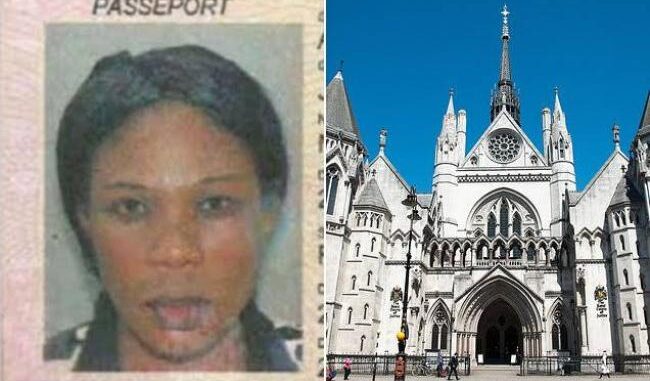
A Nigerian woman falsely declared dead has appeared in court via videolink from Nigeria to stop a convicted fraudster from seizing her £350,000 London home.
June Ashimola, 55, was officially recorded as having died in February 2019, sparking a long-running legal battle over her estate.
However, she stunned the High Court by appearing before Deputy Master John Linwood to prove she was very much alive.
The court heard that Power of Attorney over her estate had been fraudulently granted to associates of Tony Ashikodi, a convicted fraudster.
In 2022, control of the estate was transferred to a Ms. Ruth Samuel on behalf of one “Mr. Bakare Lasisi,” who claimed to have married Ashimola in 1993.
However, the judge ruled that Lasisi did not even exist and that Ashimola had been the victim of an elaborate scam.
Ashimola, who left the UK for Nigeria in 2018 and had not returned, told the court that claims of her death were fabricated.
A false death certificate had been produced, and there were even allegations that a woman had been “masquerading” as her.
“This is an unusual probate claim in that the deceased says she is very much alive,” Deputy Master Linwood remarked.
He ruled in Ashimola’s favor, concluding that Ashikodi had orchestrated the fraud and attempted to mislead the court.
Despite visa issues preventing her from attending in person, the judge accepted Ashimola’s identity, confirming her with passport photos.
The ruling effectively revokes the fraudulent claim over her London home, restoring her rightful ownership.
According to the Daily Mail, one of the most startling revelations in the case was that Ms. Ashimola’s supposed husband, Mr. Lasisi, did not actually exist—despite multiple emails allegedly sent by him.
“I find that Ms. Ashimola is alive and that the death certificate was forged and/or fraudulently obtained, produced, or fabricated,” the judge stated.
He further ruled that her alleged death was part of Mr. Tony Ashikodi’s scheme to seize control of the property from her.
“The person who appeared before me and identified herself as Ms. Ashimola bore a strong physical resemblance to the photographs in her passports,” he noted.
The judge also determined that Ms. Ashimola was never married to Mr. Lasisi and that the marriage certificate was a fraudulent or fabricated document.
“I do not accept that Mr. Lasisi exists—or, if he does, that he was aware his identity was being used. I also do not accept that the emails purportedly from him were actually sent by him,” he stated.
He found that the probate power of attorney, supposedly issued by Mr. Lasisi and Ms. Samuel, was fraudulent.
“The death certificate was not proven to the required standard, as only a copy was presented with no known provenance. There was no evidence before me that it was a genuine document representing a real event. I find it was forged and/or fraudulently produced. Those who relied on it—Mr. Tony Ashikodi and Ms. Samuel—were either directly involved in its creation or knew it was false,” he concluded.
As a result of these findings, Deputy Master Linwood revoked the grant related to the power of attorney.
The court also heard that the legal battle had already resulted in “disproportionate” costs exceeding £150,000—an amount that might surpass the property’s equity.
News
FRESH TWIST! Obasa Drags Meranda To Court Over N5BN SUV Purchase
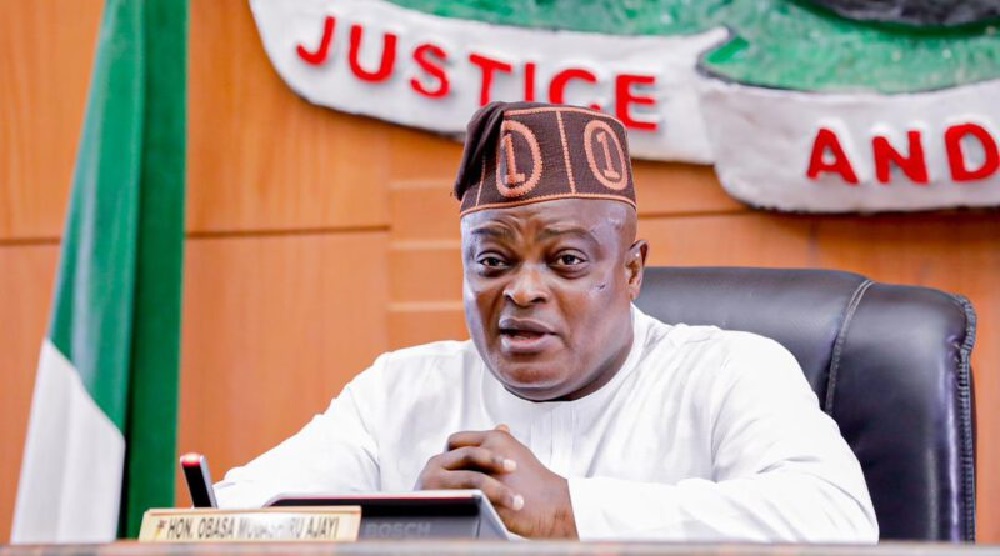
…insists on spending N7BN he had budgeted for the SUV before removal
A fresh palaver has erupted in the Lagos State House of Assembly as Speaker Mudashiru Obasa has taken legal action against his former deputy, Mojisola Meranda, over her approval of N5 billion for the purchase of 40 luxury SUVs for lawmakers during her brief tenure as Speaker.
Before his impeachment, Mr. Obasa had reportedly planned a N7 billion budget for 45 Toyota Fortuner SUVs—40 for lawmakers, one for the house clerk, and four for himself and his two wives.
However, Ms. Meranda’s decision to approve the purchase of Land Cruisers instead of Fortuner SUVs disrupted his original plan, leading to mounting tensions in the assembly.
“Obasa had his own plans for purchasing vehicles before his removal,” a source revealed. “Now that he’s back, he wants the ₦5 billion returned so he can execute his initial plan, but the lawmakers are refusing to give up their newly acquired SUVs.”
The development has triggered resistance among lawmakers, many of whom opposed Mr. Obasa’s return as Speaker.
They are reportedly standing firm against his demand to return the Land Cruisers in exchange for the Fortuner SUVs he initially intended to buy.
“Mr. Speaker is not letting this matter go and has ordered Meranda and the lawmakers to return the Land Cruisers,” another source stated. “But they are all refusing because they prefer the latest model over the 2020 Fortuner SUVs Obasa had planned to buy.”
As the legal battle unfolds, the Lagos State House of Assembly remains embroiled in controversy, raising concerns about leadership disputes and financial accountability within the legislative body.
Lagos Reporters will continue to provide updates on this unfolding political drama.
🙄
News
Video: WATCH tearful Senator Natasha reporting Akpabio to IPU
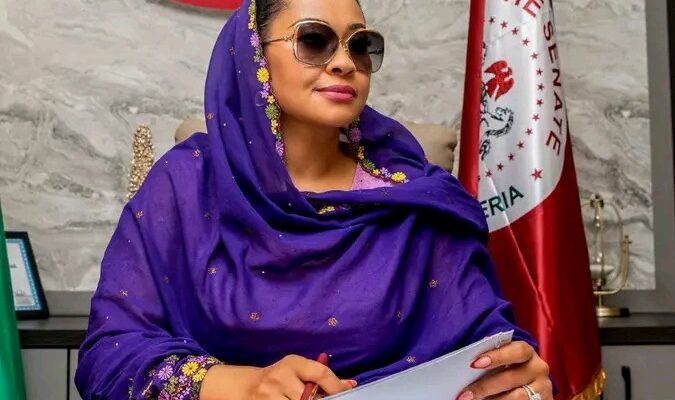
A video clip trending on the social media network shows tearful Senator Natasha Akpoti-Uduaghan reporting the Nigerian Senate over her unusual suspension.
It’s the first of its kind in the Nigerian legislature where the voice of a whole constituency will be silenced for six months.
Akpabio and his men used a sledgehammer to kill a fly.
WATCH
-
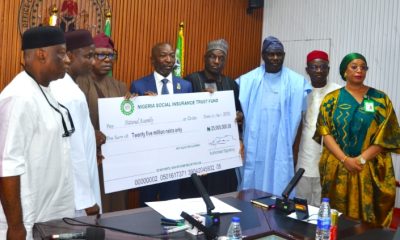
 News18 hours ago
News18 hours agoNSITF vows prompt payment of compensation, presents cheque to National Assembly staff
-

 News5 hours ago
News5 hours agoVideo: WATCH tearful Senator Natasha reporting Akpabio to IPU
-
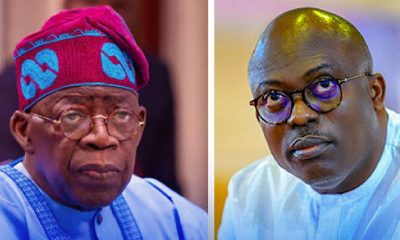
 News10 hours ago
News10 hours agoTinubu to Fubara: comply fully with S’Court verdict
-

 News20 hours ago
News20 hours ago‘We Gave You Enough Time,’ Wike Orders Residents To Evacuate From Right Of Way
-
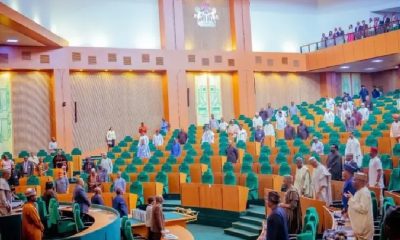
 News17 hours ago
News17 hours agoBill To Establish Federal College of Entrepreneurship Ntigha Pass Second Reading
-

 Politics23 hours ago
Politics23 hours agoEl-Rufai: Mass defection from APC Looming
-

 News22 hours ago
News22 hours agoAbomination ! “I’ve forgiven my wife for sleeping with other men”, says Ijoba Lande
-
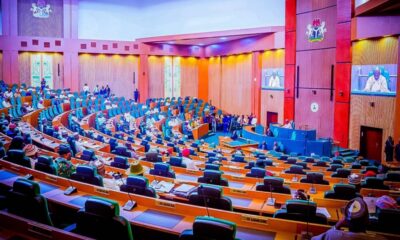
 News24 hours ago
News24 hours agoReps Commend Governor Okpebholo Over Improved Insecurity






